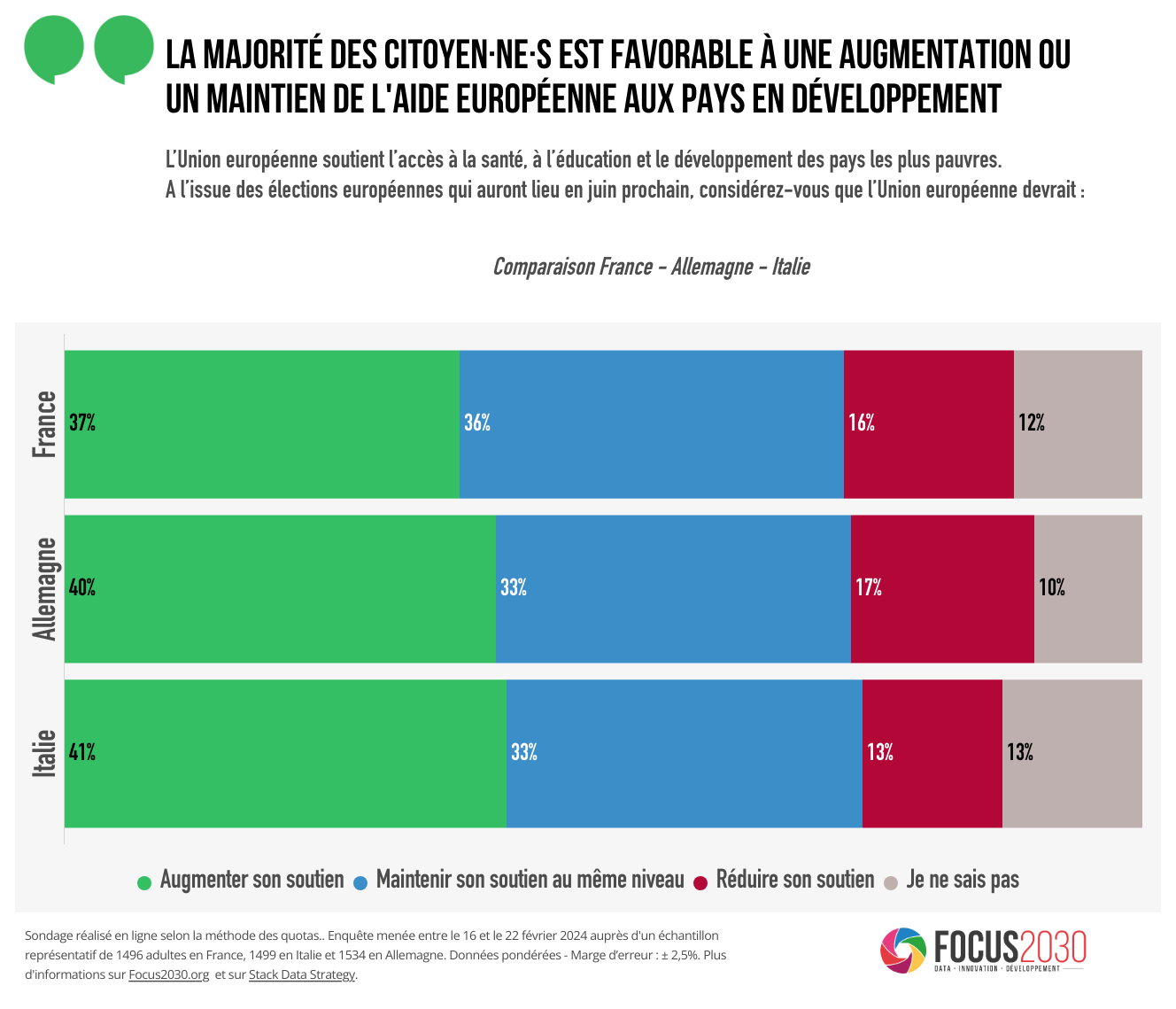Survey – Gender inequality, abortion in the constitution, feminist foreign policy: which opinions in France, Germany and Italy?
Publié le 01/03/2024.
| Special report on gender inequality in 2024:
These survey results are part of a special report dedicated to gender inequalities around the world in 2024, available in its entirety here. |
In the run-up to March 8, 2024, Focus 2030 commissioned Stack Data Strategy to survey people in France, Germany and Italy on the state of gender inequality in their countries and around the world, and on what needs to be done about it.
The survey was conducted online using the quota method. The survey was conducted between February 16 and 22, 2024 among a representative sample of 1,496 adults in France, 1,499 in Italy and 1,534 in Germany. Data are weighted and the margin of error is ±2.5%.
Low awareness of gender inequality at the national level
While the objective data available reveals that no country in the world has achieved gender equality, measuring respondents’ views reveals contrasting perceptions of inequality.
On average, 51% of respondents believe that equality between women and men has not been achieved in their country, while 43% declare that it has. In France and Italy, more people believe (or are aware) that equality has not been achieved than the contrary, while in Germany the opposite situation is observed.
In all three countries, more women (58%) than men (44%) declare that equality has not been achieved (“mostly not” or “not at all”). The likelihood of respondents being aware of gender inequality increases with left-wing political orientation and, perhaps counter-intuitively, age (44% among 18-24 year-olds versus 57% among over-65s).
Perceived stagnation in progress towards gender equality, both nationally and internationally
Asked about the evolution of gender equality in their own country over the last five years, which saw the emergence of an international public debate with the #MeToo movement, respondents in France, Germany and Italy were more likely to agree that equality had stayed the same (46%), than mostly progressed (34%). Here again, women (62%) are more likely than men (54%) to feel that equality has stagnated or regressed.
People’s perceptions differ depending on whether they are asked about the situation of women in their own country or on a global scale. When the question mentions the evolution of gender equality in the world, opinions are even more pessimistic, possibly influenced by the media coverage of recent crises that have disproportionately affected women and girls: Afghanistan, Iran, Poland, Ukraine, the reversal of Roe v. Wade in the USA…
Feminists without naming it
In all three countries, the term “feminist” elicits support and rejection in equal measure. In France, opinions are divided; in Germany, more people do not consider themselves feminists; while in Italy, a small majority declare themselves feminists. In all three countries, and perhaps unsurprisingly, more women (47%) than men (36%) consider themselves feminists, and younger people are slightly more likely to declare themselves feminists than their elders (45% of 18-24 year-olds versus 38% of 55-64 year-olds and 41% of over-65s on average).
On the other hand, when asked about their support for the principle defended by the feminist cause (ensuring that women and men have the same rights and opportunities, and fighting gender-based discrimination), a large majority of people in France, Germany and Italy support this principle (71%), with a narrower contrast between the responses of women (72%) and men (67%).
These data point to a dissociation between the word and the principle, and raise questions about the reasons for such a discrepancy, whether it’s a misunderstanding or a set of negative ideas and representations associated with the term “feminist”. Nevertheless, seven out of ten people agree with the principle, and it is almost equally adhered to, whatever the socio-economic characteristics of the respondents.
Strong support for feminist foreign policies to promote women’s rights worldwide
After Sweden in 2014, several countries have officially adopted a feminist foreign policy, or “feminist diplomacy”, as in the case of France and Germany. Conversely, other countries, such as Italy, have chosen to promote traditionalist and conservative values through their foreign policy.
Nevertheless, respondents in France, Germany and Italy declare majority support for the adoption of feminist foreign policies. This support is strongest in France (71%), followed by Italy (59%) and Germany (48%). Considering the large proportion of people who say they are neither in favor nor opposed (28% on average), net opposition to such a measure is actually very modest (9%).
In France, women are more in favor of feminist diplomacies than men (+7 percentage points), as are the over-65s (+6 points compared to the average). Education and income levels have little influence on responses.
Enshrining access to abortion in the Constitution: strong support and a powerful signal to other countries
On March 4, 2024, France became the first country in the world to make abortion access a constitutional right. A measure supported by a large majority of people in France, Germany and Italy (64% on average).
The constitutionalization of abortion is not strongly rejected by any category of the population in any of the three countries, with the exception of those on the far right of the political spectrum in Germany (19% are opposed) and Italy (18%).
Furthermore, according to 61% of respondents in all three countries, by adopting this measure, France could encourage other countries to guarantee the right to abortion. 67% in France identify a possible knock-on effect.







